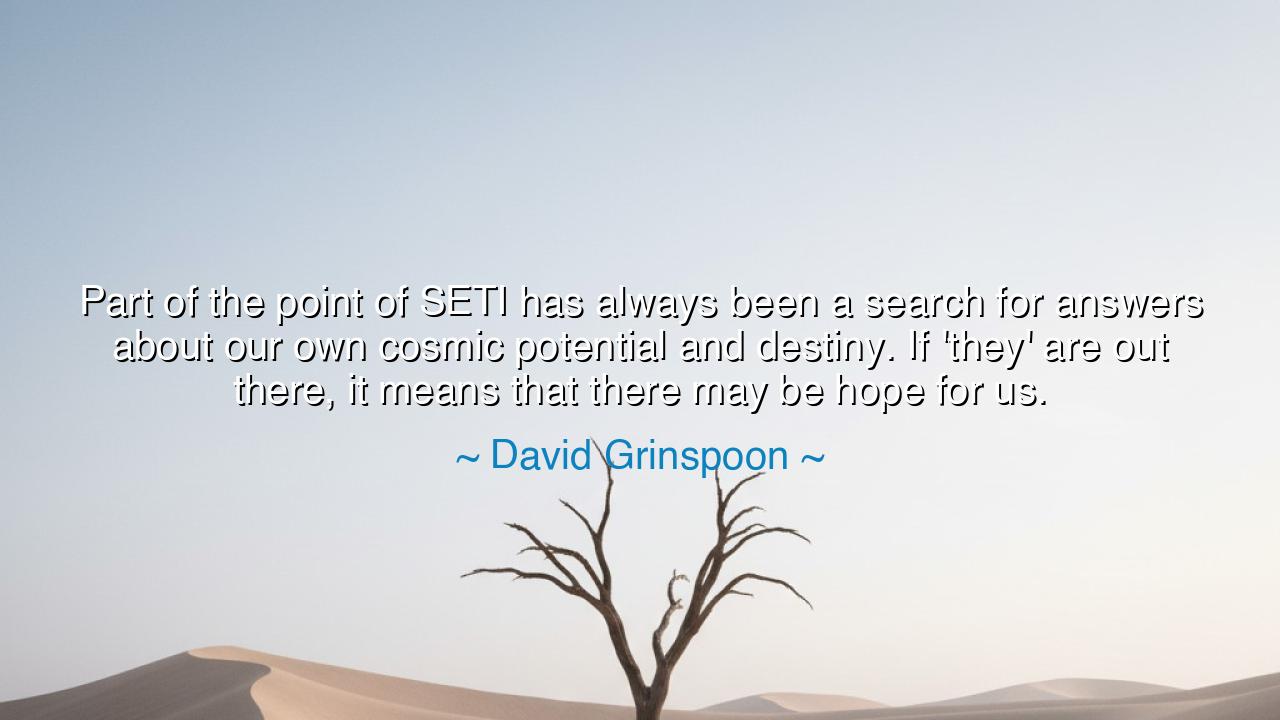
Part of the point of SETI has always been a search for answers
Part of the point of SETI has always been a search for answers about our own cosmic potential and destiny. If 'they' are out there, it means that there may be hope for us.






“Part of the point of SETI has always been a search for answers about our own cosmic potential and destiny. If ‘they’ are out there, it means that there may be hope for us.” — so spoke David Grinspoon, an astrobiologist and philosopher of the stars. His words are not merely about the Search for Extraterrestrial Intelligence (SETI); they are about the eternal human yearning to know whether we are alone — and, deeper still, whether we are worthy of not being alone. In this reflection, Grinspoon unveils a truth that reaches beyond science and into the realm of spirit: that the quest for other worlds is also a quest for meaning, for hope, for the possibility that life, intelligence, and compassion can endure beyond the fragile cradle of Earth.
For what is SETI, if not an act of faith dressed in the garments of reason? It is the modern prayer of humanity, cast not in incense but in radio waves, sent into the dark with trembling hope that someone, somewhere, might hear. In every transmission lies the echo of our own uncertainty — our longing to be seen, to be understood, to know that civilization is not a brief and lonely spark in the infinite night. When Grinspoon speaks of “our cosmic potential and destiny,” he reminds us that to look outward is also to look inward: to ask whether we, too, could survive our own folly, transcend our wars, and become wise enough to endure the ages.
The ancients gazed at the same heavens and felt the same awe. The Egyptians built pyramids to mirror the stars, believing them to be the homes of eternal gods. The Greeks called the cosmos kosmos, meaning order and beauty, seeing in it a reflection of divine harmony. Even in their myths, they sensed what Grinspoon voices in scientific language: that our fate may not be sealed within this single world, and that the heavens might hold not only mystery, but kinship. To look at the stars, they believed, was to glimpse one’s own destiny.
Consider the story of Carl Sagan, who, like Grinspoon, spent his life urging humanity to lift its gaze beyond itself. When the spacecraft Voyager 1 turned its camera back toward Earth and captured that now-famous Pale Blue Dot, Sagan wrote that all our history, all our loves and cruelties, every king and peasant, lived on that tiny mote suspended in a sunbeam. He reminded us that if we are to survive — if there is to be “hope for us” — we must learn to see ourselves as one people beneath the same cosmic sky. SETI, then, is not merely about aliens; it is about our capacity for unity, our willingness to hope that intelligence can survive the vast distances of time and darkness.
When Grinspoon says, “If ‘they’ are out there, it means there may be hope for us,” he is not dreaming of rescue by celestial beings. Rather, he is suggesting that if another civilization has endured — if it has survived its own wars, its plagues, its greed, its self-destruction — then perhaps intelligence itself is not doomed to perish. Perhaps wisdom, compassion, and progress can coexist with power. The existence of another thinking race would be proof that it is possible to build a civilization that does not burn itself out, that learns to live in harmony with its home and the universe around it.
In truth, this is what SETI has always symbolized — not just curiosity, but aspiration. The act of listening to the stars is an act of humility. It reminds us that we are part of something far larger than ourselves. It calls us to think not in centuries, but in millennia; not as nations, but as a species. And in this vast perspective, the petty divisions of humanity fade into insignificance. If we dare to imagine others out there, we must also strive to become beings they would recognize as kindred, not as destroyers of our own world.
So let this be the lesson: in searching the heavens, we must also refine the heart. Do not look to the stars only to find another, but to become worthy of being found. Let curiosity lead to compassion, and wonder lead to wisdom. Seek to build not just technology, but civilization in its truest form — one that honors life, cherishes knowledge, and guards the fragile spark of consciousness as sacred.
For if “they” are indeed out there, let them find in us not a warning, but a promise — that amid the darkness of the cosmos, there exists one small species who dared to hope, to dream, and to grow toward the light. And if “they” are not, then the burden is greater still — to ensure that we, the children of Earth, carry that hope forward into the eternal night.






AAdministratorAdministrator
Welcome, honored guests. Please leave a comment, we will respond soon